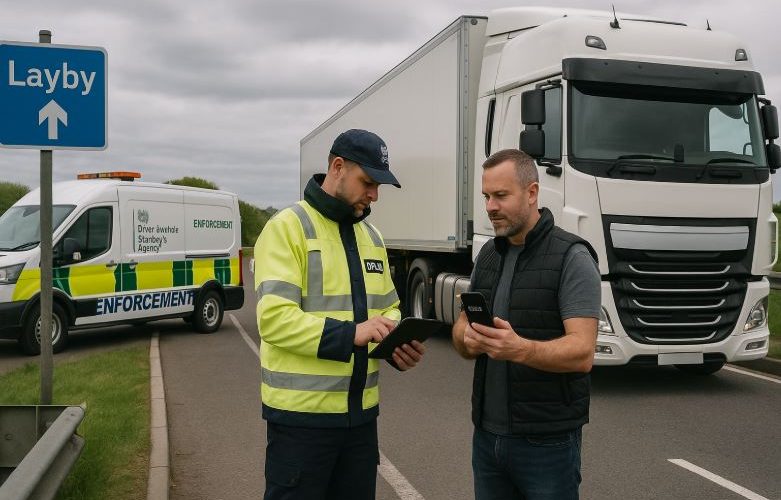Have you ever found yourself pulled over, unsure how to handle a roadside fine while fumbling for a bank card? You’re not alone. In the evolving landscape of road transport enforcement in the UK, changes are often subtle but impactful.
While the essence of roadside enforcement remains unchanged, the experience of settling penalties has taken a leap forward in convenience.
In this comprehensive guide, we’ll explore what these DVSA changes mean, what offences incur fines, how the new system works, and how drivers, both local and international, can adapt.
Whether you’re a professional HGV operator or an everyday driver, understanding these updates could save you time, stress, and money.
What is DVSA?

The DVSA is a government agency in the UK tasked with ensuring that vehicles on the road comply with safety and environmental standards. It operates under the Department for Transport and plays a crucial role in road safety, particularly for commercial and heavy vehicles.
The agency has enforcement authority to conduct roadside inspections, issue fines, and even immobilise vehicles in certain cases. DVSA officers check for various compliance issues including:
Driver’s Legal Compliance
DVSA officers can inspect whether the driver has the appropriate licence for the vehicle being driven, valid insurance, and an up-to-date MOT certificate where applicable. For commercial drivers, this also includes the operator’s licence.
Vehicle Roadworthiness and Safety
One of the primary roles of the DVSA is to ensure vehicles are safe for use. They inspect:
- Brake conditions
- Tyres
- Lights
- Suspension
- Steering
Any faults in these systems can lead to immediate prohibition or fines.
Environmental and Load Regulations
DVSA monitors compliance with emissions standards and safe load securing. Overloaded vehicles or those using tampered emission systems may be fined or detained.
The DVSA’s powers extend across the country, impacting UK residents and foreign drivers alike. Through roadside stops, inspections, and fixed penalty notices, it enforces the law directly where breaches occur.
DVSA Roadside Fines Payment Changes – Latest News
As of 28 May 2025, the DVSA has introduced new digital payment options for roadside fines. This move is designed to streamline the fine payment process and make it more accessible for drivers in the UK and abroad.
What Has Changed?
The most significant update is the inclusion of Apple Pay and Google Pay. These digital wallets are now accepted alongside traditional card payments. While the standard interface for paying by card remains functional, the layout has been updated slightly.
Many drivers may not even notice the change, but those using mobile phones will see a smoother transaction process.
Why It Matters?
According to a DVSA representative, this update is meant to provide a more efficient and user-friendly way to pay fines.
Many people, especially international drivers unfamiliar with the UK system, find contactless digital payments easier and faster. It also benefits those who may not have a physical card readily available during a roadside check.
By modernising the fine payment system, the DVSA aims to reduce the administrative burden on drivers while maintaining firm enforcement of road safety regulations.
What Offences Can You Get a DVSA Roadside Fine For?
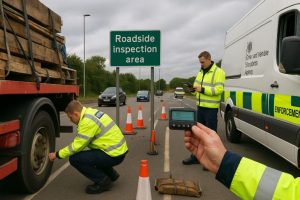
Understanding what actions can lead to a roadside fine helps drivers stay compliant. The DVSA issues fines for a range of violations, primarily aimed at commercial vehicle operators but also applicable to private motorists in some instances.
Driver’s Hours and Tachograph Offences
- Exceeding the allowed driving time
- Failing to take required breaks
- Not using or tampering with a tachograph
- Falsifying records or failure to produce them
Vehicle Roadworthiness
- Driving with defective tyres, lights, or brakes
- Dangerous load securing
- Overloaded vehicles
- Operating an unroadworthy vehicle
Documentation and Licensing Issues
- No valid driver’s licence
- No insurance or MOT certificate
- Missing or invalid operator’s licence
- Failing to present necessary documents when asked
Weight, Load, and Emissions
- Overloaded axles or total weight
- Incorrect or dangerous load securing
- Tampered emission systems (e.g., DPF removals)
Driver Behaviour
- Using a mobile phone while driving
- Not wearing a seatbelt
- Poor vehicle condition is impacting road safety
Each of these offences can result in on-the-spot fines, typically ranging from £50 to £300, depending on the severity. Multiple offences can lead to cumulative penalties.
What Is a Fixed Penalty Notice (FPN) and When Is It Issued?
A Fixed Penalty Notice (FPN) is a legal tool used by enforcement officers to penalise minor to moderate motoring offences without resorting to court proceedings.
It acts as an immediate consequence for non-compliance and provides drivers the opportunity to resolve the issue quickly.
Common Scenarios for FPNs
- Breaches of driving hours
- Driving a vehicle in poor condition
- Missing legal documentation
- Dangerous or illegal load securing
Fines Structure
- £50 for minor offences
- £100 to £200 for medium severity issues
- Up to £300 for serious breaches like falsifying records
Additional Measures
In some cases, particularly with foreign vehicles, the DVSA may demand a deposit for the fine before the vehicle is allowed to continue its journey. If payment is not made, the vehicle can be immobilised.
The FPN system allows for effective enforcement without overwhelming the court system, encouraging drivers to take responsibility for road safety.
What Has Changed in the DVSA Fine Payment Process?
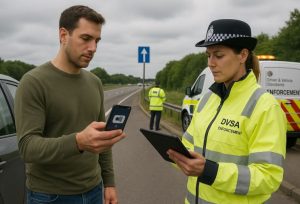
Prior to this update, drivers were limited to traditional card-based payments when settling fines at the roadside or via GOV.UK. The DVSA recognised the need for a more efficient and flexible system, leading to the recent overhaul.
New Payment Options
- Apple Pay
- Google Pay
These digital wallets are now integrated into the payment system, allowing instant payments using smartphones or smartwatches.
Updated Interface
The new layout of the payment page has been slightly redesigned for improved usability. While card payment remains an option, the interface now clearly highlights the newer methods.
Improved Accessibility
This is especially useful for:
- Drivers who don’t carry physical cards
- Foreign drivers unfamiliar with UK banking methods
- Quick roadside payments without delays
With no drastic changes to how the system functions overall, the new design focuses purely on enhancing convenience.
What Are the Benefits of Using Apple Pay and Google Pay for Fines?
Digital wallets are widely adopted in everyday transactions, and now they’re extending their utility to government services, including roadside penalties.
Speed and Convenience
- Payments can be completed in seconds
- No need to search for cards
- One-tap authentication using mobile devices
Greater Security
- Encrypted transactions reduce fraud risks
- No physical card means no exposure to card theft
Ease for Foreign Drivers
Tourists and commercial drivers from Europe and beyond can use their existing mobile wallets without struggling with card compatibility or currency issues.
By supporting modern mobile payments, the DVSA aims to remove unnecessary friction from the fine payment process.
What Happens If You Don’t Pay a Roadside Fine?
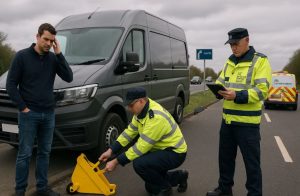
Failing to pay a roadside fine can have serious consequences. The DVSA has the authority to escalate matters, particularly when a driver ignores or avoids payment.
Vehicle Immobilisation
In many cases, especially for non-UK drivers, if a fine is not paid immediately, the vehicle may be immobilised until payment is made.
Court Action
Unpaid FPNs can lead to further legal action. This could result in increased fines, court appearances, and potentially criminal records for repeat offences.
Administrative Costs
Late payment or legal action may add additional administrative or recovery charges on top of the original fine.
To avoid these consequences, it’s essential to pay promptly, using the new digital methods or traditional card payments.
What’s the Process for Paying a Roadside Fine Online?
Drivers who don’t pay fines immediately at the roadside can still do so online through the GOV.UK website. The steps are straightforward.
How to Pay?
- Go to the official payment page
- Enter the FPN reference number
- Choose a payment method (Apple Pay, Google Pay, or card)
- Confirm the details
- Complete the transaction
Required Details
- Reference number from the notice
- Vehicle registration number
- Contact details
Timely payment ensures the matter is resolved and avoids further enforcement actions.
What Should Drivers Do to Avoid Roadside Fines in the First Place?
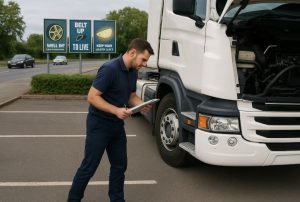
While the DVSA’s new payment system is convenient, avoiding fines altogether is ideal. Compliance with UK motoring laws is essential for all drivers.
Preventive Measures
- Perform daily vehicle checks
- Ensure all documentation is current
- Monitor driver hours and take breaks
- Avoid phone usage while driving
- Use legal and well-maintained equipment
Tips for Commercial Drivers
- Keep tachograph records up to date
- Use approved emissions equipment
- Avoid overloading and secure all loads properly
Awareness and responsibility are the best defences against receiving fines on the road.
Conclusion
The DVSA’s decision to enhance its roadside fine payment system marks a welcome shift towards digital convenience. With the introduction of Apple Pay and Google Pay, the process has become faster, more accessible, and safer for all road users.
This change doesn’t replace existing systems but complements them, making enforcement more efficient and less intrusive.
For UK and foreign drivers alike, understanding how these changes affect compliance and payment is critical. The law remains the same, but how you engage with it is now significantly easier. By staying informed and prepared, drivers can navigate roadside stops with confidence and avoid unnecessary complications.
FAQs
How do I know if I’ve received a DVSA roadside fine?
You will be issued a Fixed Penalty Notice directly by a DVSA officer at the roadside.
Can I pay my DVSA fine online?
Yes, you can pay online using Apple Pay, Google Pay, or a debit/credit card via the GOV.UK portal.
Are foreign drivers required to pay fines on the spot?
Yes, foreign drivers may be asked to pay a deposit for the fine immediately to avoid vehicle immobilisation.
What is the minimum and maximum DVSA roadside fine?
Fines range from £50 for minor offences to £300 for serious breaches.
Do the new payment changes apply to all types of offences?
Yes, the new payment methods apply to any fine issued by the DVSA at the roadside.
Will the new system work if I only have a card?
Yes, card payments are still accepted as usual with a slightly updated interface.
What if I don’t have Apple Pay or Google Pay?
You can continue to use a debit or credit card without any issues.





